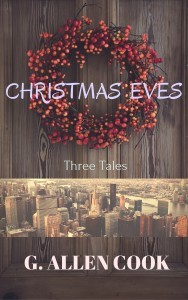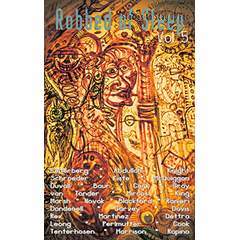G. Allen Cook's Blog
December 2, 2018
The Next Anthology Has Been Canceled
It is with regret that I announce the cancelation of Deductions, Delinquents, and Detectives, BANJAXED’s next planned anthology.
A few weeks ago I suffered what I thought was a heart attack. After various tests and medications, I hope it was some other issue–but a heart is nothing upon which to gamble. It was suggested that I lessen my stress load and keep calm at all times, so I found myself choosing which of my large projects to cancel. Besides the anthology, I was co-writing/composing a major musical, writing an adult novel, and writing/illustrating a picture book for young readers. Of these projects it seems the anthology was the largest, as BANJAXED had received nearly 200 submissions to consider.
All stories and rights are herewith returned to their authors. I had thought to publish the anthology sometime in the future, but some authors have made their ire known to me, so it’s looks as though the project is dead in the water.
While I understand their frustration, I would hope the authors realize my health is my priority, and that they refrain from pillorying my name in public. This was not something I could control.
I am, however, extremely sorry, and no one is more disappointed concerning these turn of events more so than myself. We received some incredible stories, and it sickens me to note that I will not be the one to publish them.
BANJAXED undoubtedly will publish more anthologies in the future, and it is my wish that authors understand why this had to happen and will submit their work to us again. Till then, I wish you all the best of luck in finding homes for your fiction.
G.
July 20, 2018
My First Illustrated Novel
My first illustrated book will be called “The Viking Crew of the Brooding Fairy.” While it will take me a while to finish writing it (I’m editing an anthology–check it out by clicking Submissions above), meet the fierce crew.
The Viking Chieftain: Radcliff Bloodbeard
His Queen: Fairuza Ironclad (I highly doubt a woman as powerful as Fairuza would actually take a man’s name upon marriage.)
The Steersman: Daan of the Deadly
Scholar: Jacob Incommodious
Journeyman Cook: Phlegm Hardtack
Bard (musician): Baird the Dissonant
Weapons Master: Magnus Breakneck
And the rest of the crew:
Aart the Temerarious
Uffe Cankersoar
Zeb the Really Really Sincere (Zeb has an arrow permanently stuck in his skull–pulling it out would kill him, so they’ve left it in, and it’s caused both good and bad things.)
I don’t want to give away too much, but there’s the resident filungar (boat builder), Ib the Deaf, who gets the intended name of the Chieftain’s new boat very, very wrong.
And a determined young lad simply called Welp.
Together the crew of the Brooding Fairy face sea monsters, hurricanes, curses and spells, an English bureaucrat who holds no truck with looting and pillaging, thank you so very much, a Welsh cauldron that grants everlasting life (but at a deadly cost), singing vampiric sirens, and a host of other adventures.
To say this will be an uproarious book is an understatement. My family just checked on me because I was literally laughing–tears in eyes–while I was finishing up some of the Vikings’ names. The book will be appropriate for both children and adults. I pride myself in being able to offer stories fit for both age groups.
If you’ve a mind to, please RT this post. I want everyone to read it when it comes out in paperback. I don’t quite have a timeline yet, but I should have a launch date in a week or two.
Come join the gang on the Brooding Fairy! You’re sure to have a raucous time.
More soon.

January 26, 2018
Am I A Real Writer?
All throughout Twitter one can see other writers describing their process…and the superstitions, er…I mean preparations to help them begin writing. I read and take note of these, but I fear I don’t qualify, as I do none of the things I see other writers doing.
Here is a list concerning all the ancillary work in which other writers seem to glory.
1.) 
Coffee. Let me state now: I do not drink coffee. Not only does it lack the magic powers it seems to give other writers, it tears up my stomach something shocking. I see posts in which folk run out of coffee–or don’t have their favorite brand–and actually admit they can do no writing until the problem is fixed. I’m not a coffee drinker, so I must wonder if I’m a true writer.
2.) 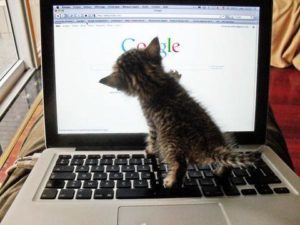
Cats. Oh, dear. This is a biggie. It’s not that I dislike cats, it’s that I’m deathly allergic to them. How allergic, you might ask? I was in a production of A Christmas Story two or three years ago, and the director delivered the script to me. As I read over it, I noticed my nose began running, and my throat closed up to the size of a dime. It became bad enough that I considered going to the ER. Before I did so, I called the director and asked if he had cats, as my symptoms were identical to that allergy. He admitted he had several. I wrapped the script in a plastic bag, tied it up, and set it outside. My symptoms abated within moments. THAT’S how bad my cat allergy is. So no cat for me pawing at the keyboard while I’m trying to type. Fuzz balls of death, I call them.
3.) 
Writing circles (whether formal or informal). I just don’t get it. I can’t imagine showing my unfinished work to a group of other writers for critique. My first draft is usually squalor. Worse than squalor. By the time I type “The End” on a project, I reread what I’ve written and slip into a bout of severe depression. “I’m no writer,” I moan to myself. “I’m just a fraud. Who am I kidding?” Then I see folk extoling the praises of dozens of writers with whom they’re in contact…and so I ask, “But what about me? I’ve written and published several projects! My latest anthology–a post-apocalyptic collection of short stories–is represented by twenty authors, one of which is me! I’ve an original Irish collection, a horror collection, a zombie story that eschews all the zombie tropes! Why not include me?” -sigh- Relegated to anonymity. Again, I could never show my first drafts to anyone, so it’s a moot point.
4.) 
I’ve a hard time Tweeting with professional writers–the Bestsellers, that is. I admire them, follow them on Twitter, read every word they Tweet or publish…but the thought of communicating with them leaves me feeling even more a fraud. That’s not to say I haven’t done so. Just last night I Tweeted Anne Rice about a political piece she posted on her Twitter feed. No response, of course–she undoubtedly receives hundreds of Tweets a day from folk like me–but I did it. And other than a few Tweets to Stephen King and Nora Roberts, I’ve stayed away from the big boys/girls. (Although I did Tweet actor/songwriter Paul Williams, which wound up being a great conversation, ongoing to this day. He even followed me. Heady stuff!)
5.) 
I’m an indie-author. Many of the writers I follow have agents and are published through the big houses. But this is my choice, as my limited association with a publisher–this one for plays–wound up being a four-year battle in which the manuscript was “lost,” could I resend it? “No, I received a receipt that you had it, loved it, and was sending it up the ladder for approval. I will NOT send another, as you clearly already have one.” A few years later–after I considered that play a loss–another play that was practically identical to mine opened on Broadway. It was changed in nonsensical ways, and it folded during previews. I sent a short, terse card to the publisher (who shall remain nameless) that said: “If you’d only kept my original material you might’ve had a hit on your hands.” So I’m an indie-author, AND an indie-publisher. That has proven difficult, but ultimately rewarding. Traditional publishing will be dead in twenty years anyway, so I’m not worried about it.
Those are but a few reasons why it’s difficult for me to consider myself an author. But in other ways I have help in indie-authors cheering me on, as I do them. Without their support, I don’t know if I’d even keep at it. I’ve sold several project, and they do okay. Our current anthology is selling like gangbusters, and I believe that’s because it represents twenty different authors–all of whom are promoting the book. It may be the first project of mine I’m truly proud of.
Well, there it is. Why I don’t feel like a true writer. I should add that’s only on bad days (which can be numerous)–the good days fill me with excitement and desire to write twelve different projects at once. I pick one, of course, but I always have another book in the back of my mind while writing the current WIP. I’m blessed with a source of stories that never quits. Whether they are appreciated by the reading public or not doesn’t concern me. I write books I want to read…then I publish them under our publishing banner…BANJAXED Books…for others to either enjoy or ignore.
I get a lot of the latter. But when I hear from someone who reads the work and praises it, it gives me ten seconds of joy. Then I’m back to wondering just what the hell I’m trying to accomplish as a writer.
To quote Vonnegut: “So it goes.”

January 7, 2018
A New Post-Apocalyptic Anthology

I'm (finally!) happy to announce the publication of "Chaos of Hard Clay," a twenty-author anthology detailing the various ways society--and the world--devolves. From climate change to plague and from AI takeover to zombies--it's all here.
"Chaos of Hard Clay" is a 348-page paperback edited by G. Allen Cook and Kathy Cook. It is published under the BANJAXED Books indie-pub. It can currently be found at Amazon (and a few other places...if you poke around enough), and it should be available to order from some brick and mortar establishments in the coming weeks. (It's 7 January 2018 as I write this.) Here's the link to Amazon: http://mybook.to/hardclay
We would be honored if you gave our book a try, and we hope you enjoy it.
Happy reading!
G. Allen
October 29, 2017
Anthology News
A Post-Apocalyptic Anthology
Chaos of Hard Clay, published by BANJAXED Books, is a collection of new stories detailing life after the Apocalypse. Within its pages readers will find mutants, plagues, zombies, climate change, and a host of other catastrophes that will change the way humankind lives.
Nineteen authors bring readers their vision of a world gone mad, a society in ruins, and characters engaging in whatever must be done for survival. Here you’ll meet the good, the bad, and the mutated–all of them adapted to a way of life readers pray will never occur.
At over 72,000 words, Chaos of Hard Clay represents a massive vision of Hell on Earth, brought to you by today’s most promising authors, including:
(in order of appearance)
Olin Wish (Take Me to Your Fucking Leader)
N. J. Reynolds (Black Water)
Luke Kondor (Dust and Fingers)
Jim O’Donnell (Hanging, Just Outside the World)
Daniel Willcocks (When the World Fled East)
G. H. Finn (Grim Diesel)
Vonnie Winslow Crist (Dead Wrong)
Steve Bissonnette (And To All a Good Night)
Ray Pew (How Do They Like It)
Meghan Manzano (Verity)
Kamron Taylor (What Remains)
Hannah Adcock (A Short History of the Future)
Jack Stone (After)
David Henderson (A Game of Tag)
Roxanne Dent (Ghost Woman)
Hákon Gunnersson (What’s Below the Surface)
Jessica Mizell (Been Here Before)
Crystal Leflar (No Tears in Space)
Justin Bloch (The Beginning, Again)
Launching in mid-November, 2017, Chaos of Hard Clay will thrill readers with extreme images of a world that could easily come to be. Please purchase this new paperback book and share in the exciting tales brought to you by these engaging authors.
More info coming soon.
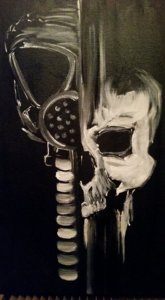
April 9, 2017
Free Story–NIGHTSTONE’S CHILD
The following tale, Nightstone’s Child, can be found in my original anthology, “Odd Men Out.” I will offer it here–and change it up with other stories, some published, some otherwise unpublishable (due to content or ability, etc.). This is an older story, and some parts make me wince–the old midwife near the end…as my editor often says, CLANK CLANK CLANK…meaning she’s found another dues ex machina in my writing. Well, I present it here, as published, a look into one of my earlier pieces. I think it fine for a Saturday afternoon read–especially if it’s raining out, and the spouse (or the kids…or the parents) is away. Yeah, that sounds just fine indeed.
Nightstone’s Child c 2015
NIGHTSTONE’S CHILD
Two men hunkered in the bushes near the south wall of Nightstone Manor. There’d been no coming or going since their arrival, the windows dark and lifeless. The moon threw baleful light across the grounds.
They’d sat in silence for hours, casing the joint. One of them—a tall, thick‑lipped palooka—shifted his weight. The other, smaller and wiry, shot him a dangerous look and waved for silence. The big guy sighed.
“Shut up, will ya?” the small one hissed. “You’ll spoil the works with that racket.”
“Aw, come on, Mort. There’s no one here. Hasn’t been all day.”
“Don’t be fooled, kid. That’s what they want you to think. They’re there, alright.”
“How do you know?”
“You think I’d jump blind into a job like this, Hughie? I read up on our friend in the big house over there. Carl Nightstone. Oil magnate. Millionaire. Eccentric.”
“What’s eccentric, Mort?”
“It’s when you got so much dough you go funny in the head. Like that Howard Hughes fella. And our boy, Carl Nightstone, is as funny as they come.”
“Funny, how?”
“Never leaves the house, see? I heard tell he’s afraid of germs, or some such. Maybe he’s one a them—what’cha call it—paranoids.”
A breeze stirred the bushes, and a thorn protruding from some malicious vine pricked Hughie’s finger.
“Ow!”
With a low curse, Mort clapped a hand to his partner’s lips. “Dope! They heard you sure that time.”
But they saw no movement within the mansion. Starlight displayed a house tenebrous and still. The two men sat a while longer, unaware of the poison sumac choking the small boughs around them.
“Mort, can I say something?”
“No. Shaddup.”
“It could be important.”
“You never had an important thought a day in your life. Why have one now?”
Hughie sulled up and sat in such a state of despair that Mort sighed and said, “Alright! Tell me.”
“They’re millionaires, right?”
“They ain’t Bowery bums, if that’s what’cha mean.”
“Why’s no one guarding the house, then? Seems like anyone could bust in and fleece the joint.”
“That’s the idea, whiz kid.”
“But wouldn’t they think of that?”
“I said he was eccentric, didn’t I?” Mort snapped, his confidence shaken. “Keep your thoughts to yourself, you lug. We got this far, right?”
“You mean in the bushes?”
Mort raised a threatening hand; Hughie shrank from it.
“Just . . . button your lip and leave the thinking to me.”
Hughie sighed. “Sure is dark in there.”
“So much the better,” Mort replied. “They’ll never see us coming.”
“If they can’t see us, we can’t see them.”
“So?”
“Suppose they see us first?”
Mort chuckled to himself. Digging in an inner pocket of his coat, he produced something that reflected the moon’s light into Hughie’s eyes. The big man gaped. “Where’d you get that, Mort?”
“Never you mind. Think of it as our insurance policy.”
“You—You ain’t gonna shoot nobody, are ya?”
A menacing leer traced Mort’s lips. “It’s almost two. Let’s go.”
They crept along the hedgerow. After surveying the grounds, Mort raced them across the considerable length of yard to the stone edifice of the south wall. Pressing against the cool stones for cover, they paused for breath.
Large windows flanked the ground floor. Mort peered through one; though curtain‑less, the glass was fogged and impenetrably dark. If only he’d stolen a flashlight after he’d clipped the gun . . .
No matter. The little man searched another pocket for two thin metal wedges he carried for such occasions. Signaling Hughie to keep watch, Mort set upon a window seal with them, making quick work of it.
They slid inside Nightstone with surprising efficiency. Even Hughie, ponderous and slow, made little sound. But so fixed were they on the job it took a moment to notice the peculiarity of their surroundings.
“What is this?” Mort took several steps into the gloom. He turned to Hughie, an immense shadow swathed in darkness. “It’s empty.”
“Maybe they’re redecorating.”
They crept to the door and slipped into a neighboring room. Though dark, it echoed with the open feel of a gallery, and it, too, was empty.
“They’ve moved,” Hughie whispered. “Them germs gone and ran em off.”
“They’re here,” Mort said. “I feel em. C’mon.”
Room after room proved bare. No possessions; no pictures. The bathrooms were unfurnished and without mirrors, the kitchen bereft of utensils.
Hughie began to fidget. “This ain’t right,” he mumbled. “Makes me feel all creepy‑crawly. Let’s forget the job and get outta here, what do you say?”
Mort waved for silence. Something in the corner caught his eye—a flicker of light behind an otherwise inconspicuous door. He eased toward it, gun drawn. Hughie followed obediently.
The knob turned without sound. Mort peered behind the door into a descending stairwell. Light danced in its lower depths.
The stairs creaked underfoot. Mort felt Hughie shivering behind him but pressed on until they stepped into a low‑ceilinged chamber aglow with candlelight. Their shadows chased along the stonework corridor.
“Clever Carl,” Mort marveled. “Builds a big house for the world to see . . . and lives under it. I bet there’s a whole living space down here. Bathrooms and everything.”
Hughie pulled Mort’s sleeve. “I’m scared. It’s like a tomb down here.”
“Stow that talk! Anyway, we’re close, kid. I know it.”
The hallway made a series of twists and turns; both men felt the floor pitch downhill. A sharp chill clung to the flagstones and sought the busted seams of their boots. A few candles guttered in their wake.
They came to an open door; darkness roiled in the room beyond like malignant mist. Hughie backed away. “No way, huh uh. Not going in there, Mort. It’s too dark.”
Mort put a finger to his lips and motioned for Hughie to follow; the big man refused. Glaring, Mort pried a candle from its wall mount and thrust it into the blackness, throwing light across what proved to be a nursery. He turned to Hughie and mouthed, “Better?”
Hughie pouted but followed as they crossed the threshold of the room. The small chamber held fiercely to its dark, fighting the candle’s attempt at illumination. Even so, it was obviously a baby’s room. The scent of powder pervaded the air; a changing table held nappies and pins. In the corner stood the crib—wooden, cage‑like . . . and occupied.
“Bingo,” said Mort.
They approached the bassinet and the swaddled bundle asleep within. Mort pocketed his gun to reach for the child. Hughie stopped him. “We really gonna do this?”
Mort pulled away and held the baby in his arms. “Get the changin’ bag,” he instructed, nodding toward the table. With some hesitation, Hughie fetched it.
An evil smile creasing his features, Mort began to retrace his steps, but Hughie put a restraining hand on his shoulder. Mort spun around, teeth bared. “Lay off,” he growled. “You wanna gum up the works?”
“I ain’t moving till you promise we don’t hurt the kid.”
“Will you quit foolin’ and get a move on?”
Hughie planted himself to the spot, arms folded. Something unpleasant hardened Mort’s expression, a flash of rage in the darkness. “I’m warning you, Hughie, louse this up and I’ll—”
Movement within the bundle turned Mort’s ire into panic. “It’s waking up, you dope! Let’s get outta here before it starts crying.”
“Not till you promise the kid don’t get hurt.”
“Fine, Hughie. Fine! The kid’s safe with me. I’ll take him to the circus and buy him ice cream, if that’s what you want. Now, will you get a move on?”
Nodding with satisfaction, Hughie trailed Mort through the underground tunnel and back upstairs. It took a while to find their way in the dark, but they eventually came to the gallery and—one room beyond that—the open window.
They crossed the lawn and jumped the hedgerow. A dirt road leading to and from Nightstone veered left, a chuckling creek to the right. The grove thickened into a lush barrier between the mansion and civilization.
Without slowing, Mort did something he’d needed to do since entering Carl Nightstone’s home: He coughed . . . and winced at the resultant pain in his chest.
* * * *
Mortimer Shank, AKA Short Mort, AKA Quick Shank, had paroled out of stir three weeks earlier thanks to a glut of crime and a lack of cells in the county. A smalltime con, he’d been in and out all his life for petty indiscretions and plain bad judgment—a nobody to a system that needed room for hardened criminals, men whom the Depression had made lean and vicious with want. As he strode one last time down the stinking corridor toward freedom, Mort turned to the accompanying officer and said, “Sprung because someone worse than me came along. Ain’t this depression great?”
They threw him out and locked the door.
With only a secondhand suit and a chronic cough, Mort made for the city and his cousin, Hughie Gray, a part‑time dishwasher at Irving’s Diner. He found the place dark and Hughie sitting on the curb, head in his hands.
“Closed,” Hughie moaned. “Out of business. Kaput. It’s sure swell to see you, Mort, but what am I gonna do?”
“Forget this dive. Irving was a creep, and you know it.”
“He was a creep that paid twenty cents an hour.”
Mort pulled Hughie to his feet, noting his cousin’s threadbare attire. “A man can work himself up from dishwasher to king if he has a mind to.”
“But the whole country’s depressed. Ain’t you heard? There’s no jobs.”
Winking, Mort said, “Jobs for your average sap, maybe, but for someone with my vision, prosperity’s always round the corner.”
Maneuvering down sidewalks lined with the unemployed, they saw doors chained, windows boarded, foyers empty. Park benches served as flophouses for the indigent. Outnumbered, the cops paid no mind.
The cousins eventually found themselves in a well‑to‑do part of town, a collection of shops and eateries that catered to Society. A limousine idled before them, its owner unseen behind polarized glass but undoubtedly decked in finery worth more than either man had made in years.
“Look at that,” Hughie sighed. “Some guys got all the luck.”
“That ain’t luck, kid. Someone like that with plenty to share—you see him out spreading the wealth? Ha! Most of his money’s hidden away in some Buenos Aires bank.”
Mort raised both hands to make a rude gesture, but a sudden pain in his chest set him reeling. Hughie caught him, propped him up. “Mort! Mort, you okay?”
“Fine,” Mort wheezed. “Jail’s a dank place; I’m always catching something. Help me to that bench.”
They sat awhile, eyeing the uppity goings-on until the pain abated. Recovered, Mort grabbed a discarded newspaper to crumple and throw at a passing snob. The headline, screaming in bold print, caught his eye.
SON BORN TO RECLUSIVE OIL MAGNATE!
Below that, in smaller type:
INFANT DELIVERED IN UNDISCLOSED LOCATION.
“Talk about luck,” Mort grumped. “We kill ourselves for a lousy buck and this kid’s born into millions.”
Hughie shrugged. “Not his fault. Ain’t you never heard you can’t pick your parents?”
“Aw, go pick your nose.” Mort gave the article a cursory glance, favoring the short, uncomplicated words. “Carl Nightstone, eh? Got that big place out in the sticks. Man oh man, his kid’s gonna have it good. Says here Nightstone’s worth half‑a‑billion. Think of it!”
“I can’t count that high.”
“Well, I can count for both of us.” The little con licked his lips. “Five hundred million. Sure is a lot of lettuce for just one family.”
They sat a while and watched the glitzy clientele flit between shops. When the afternoon grew late, Hughie invited Mort back to his place for beans and cheap wine.
They celebrated their reunion in style.
* * * *
Something was wrong with the baby.
Hughie tried changing it, burping it, and bouncing it, but it would not cease its keening banshee wail, a sound unlike any child’s cry he’d ever heard. Not only that, the baby looked sick. Pale and opalescent, its skin exposed a network of veins beneath a translucent surface, its features gaunt and wan. Hughie thought babies were supposed to be pink and fat.
“Shut that kid up!” Mort yelled, coughing into his sleeve. “I’m writing the note.”
Hughie bounced the tot harder. “C’mon, sport. Stop that racket for Uncle Hughie, whaddya say, huh?”
“Give it some milk.”
“He don’t like it.” Each attempt to slip the baby a bottle ended with Hughie dodging projectile upchuck. “He won’t take anything I feed him.”
“Kids today,” Mort spat. “Don’t appreciate nothing. Change him and put him to bed.”
“No need.” Hughie placed the clumsily swaddled baby on the folding couch to cry itself to sleep. “He ain’t done nothing to change.”
“Just a matter of time. C’mere and lookit.”
Hughie peered over Mort’s shoulder at the hodgepodge of lettering culled from old magazines. A difficult reader at best, he could barely make out:
WE GOT THE KID. LEEVE 1 MILLION BUCKS NEAR BIG OAK IN TOWN PARK BY SUNDAY NITE. NO COPS OR THE BABY DIES. WE MEAN IT.
“Genius,” Mort said of his handiwork. “Hughie, old kid, we’re in the chips.”
“But we ain’t really gonna hurt the little guy. You promised.”
“Naw.” Mort held his letter with gloved hands to the light, checking for prints. “We won’t hurt him. But they gotta think we mean business. Right?”
“I s’pose,” Hughie mumbled, turning back to find the baby asleep. As the itch of poison sumac began to flare on his skin, Hughie settled beside the tike to scratch himself and await further orders.
* * * *
The last jail Mort Shank paroled out of boasted no medical facilities. When the chest cold he’d developed the previous winter did not subside, the warden furloughed Short Mort to the nearest doctor, a sawbones some miles down the road in a desolate patch of ground known as Walnut Hill. The warden was not concerned with Mort’s well‑being—he simply didn’t want a possibly tubercular con infecting his air.
The ride was pleasant enough, even if it was in the bed of a pickup that would’ve been old when Mort was in knee pants. But with spring waking the surrounding fields, the mild air was kind to the little con’s lungs.
The truck pulled alongside a shack slumped on the bank of a yellowed pond. Two young screws fumbled Mort and his iron leggings from the bed and hauled him inside to face a grizzled codger in stained surgeon’s whites.
“Take em to the back,” the old man snarled, the smoke from a well‑juiced cigar suspended above him. “Then you boys wait outside. Like as not he’s contagious.”
The two guards did not take Mort anywhere, electing instead to rush outside and scrub their hands in the stagnant pond. The doctor regarded his patient with eyes both rheumy and gladsome.
“I’ll be dipped in pitch if it’s not Quick Shank.”
Mort shook his head with an unbelieving laugh. “I thought that was you, Philly Dan!”
“Doctor Filbert.” The old man cleared his throat, nodding toward the door and the guards beyond. “Be a pal and play along.”
“How long you been out?”
“Paroled eight years ago. Spent time in Argentina. Learned a trick or two with lancets and catgut.”
“Argentina.” Quick Shank snorted. “Mind telling me how Philadelphia Dan Larsden got a license to peddle medicine in this state?”
Filbert winked a watery eye. “Same way a fifth‑grader named Mortimer Shawn conned the township of Chicago, Illinois, out of a driver’s license.”
“They’d a never caught me if that hearse I pinched hadn’t popped an axle,” Mort replied. With a nostalgic grin, he added, “My first time in stir. Two counts a theft: The car and the corpse.”
With a clipped chuckle, Filbert led Mort to his examination room—a dank supply closet with a moldering cot and little else. He produced a stethoscope missing an ear piece and pressed it to Mort’s chest.
“My clientele is fairly exclusive,” Filbert said, the stethoscope’s sole tine jammed in his fuzzy ear. “I tend jailbirds like you, though I haven’t treated so much as an ingrown toenail in weeks. With this depression on, most screws are content to let sick cons die. Cheaper to bury them than nurse them. What makes you so special as to warrant my services?”
Mort shrugged. “I got this cough. Deep down. Pinches something awful. Warden though it might be TB.”
“You might’ve said before I handled you,” Filbert replied. “Spit up much?”
“Sometimes.”
“Taste like tar?”
“What?”
“Your snot—does it taste like tar?”
“No.”
“Probably not TB, then.” Filbert cast aside the busted scope. “Can’t do a proper diagnosis with this trash. You want a prescription?”
Mort considered it, shook his head. “The warden confiscates the good stuff for himself. As long as you’re sure it’s not TB.”
“Doubtful.”
Buttoning his shirt, Mort leaned in to whisper, “Is there a backdoor?”
“Just the front,” Filbert replied. “And you can forget the window—it don’t open. They’d hear the glass break and be on you like fat on a Baptist. Sorry, Quick Shank.”
Mort clapped his old friend on the back. “Don’t hurt to explore your options.”
* * * *
“Stop! Come down! Help!”
Mort heard the commotion long before he reached the shack’s rickety stoop. He’d been to mail the ransom note and take some air for his inflamed lungs. Now, hearing Hughie’s voice echoing down the lane, he cursed his cousin for a fool and quickened his pace. Gaining the stoop in short order, Mort burst through the door.
“Stop that racket! Do you want every cop on our—”
The little con stopped short. Hughie, arms flailing above his head, stood on tiptoe. Atop a tottering bureau—just out of reach—sat the baby, its eyes shark‑like and hideously aware.
“Come down!” Hughie cajoled. “There’s a good boy!”
With a sharp cry, Mort lunged to steady the sideboard. He saw Hughie’s fingers brush against a tiny foot. The baby giggled and pulled away.
“No infant can climb like that,” Mort growled. “What did you do?”
“Nothing! I turned my back for a second to go to the john, and—”
“And I s’pose he got up there by himself, whiz kid?”
Hughie whimpered. “No. Yes. I don’t know!”
“I should have my head examined for leaving him with you. Step aside—I’ll get em down.”
Mort started to scale the bureau, but to no avail. The baby was gone.
“Holy crow,” Hughie gasped. “Look in the kitchen!”
They ran into the adjoining room to find Nightstone’s son sitting amongst the cobwebs atop a dead Frigidaire. The baby cackled at their approach.
“I’m done playing with you, kid,” Mort bellowed. “Come down, or so help me—!”
As if in abeyance, the baby toppled from the fridge. With a shrill cry, Hughie lunged forward. He caught nothing but air.
“My God,” Mort rasped.
The child hovered above their heads, laughing gaily.
With a swipe of an enormous hand, Hughie snagged the baby and hauled it down into a smothering embrace, cooing softly in its ear. “It’s alright,” he whispered, the baby gurgling contentedly in his arms. “It’s okay, sport. It’s alright. Uncle Hughie’s gotcha.”
Mort sank down onto a chair, his face pinched and pale. He absentmindedly rubbed his chest as Hughie fussed over the strange parcel they’d clipped from the bowels of Nightstone Manor. A band of pain tightened around his lungs as Mort began to wonder who—or what—would be answering the ransom note.
“What’d we get ourselves into?” he gasped.
And then he fainted.
* * * *
“Mort! Hey, Mort!”
“Get up, Quick Shank! Warden’s coming!”
“Come on, Morty! Get off the floor!”
An authoritative voice barks for an explanation.
“I dunno, warden. He just fell down.”
Feet shuffle. An angry presence draws near.
“On your toes, Mortimer. Stand up!”
“Somethin’s wrong with em, warden. Lookit all the blood he coughed up.”
“Shut your hole and carry this piece a trash to his cell. Go on, pick him up!”
Rough hands grasp him under the shoulders and drag him down a dim passageway. “Snap to, Quick Shank. Don’t let em see you weak. Come on, wake up!”
* * * *
“Wake up.”
The sounds of jail blurred into the blandness of Hughie’s shack. It was not his cousin’s voice that bid him to wake, however, but that of an old woman. Mort opened his eyes to see a wizened face glaring at him.
“There’s hope,” said a toothless crone with one eye. “He lives.”
“Hughie?” Mort tried to regain his feet, but pain flared in his chest, robbing him of strength. “Hughie, what’s . . . what’s going on?”
The giant con stepped into view, the baby nestled in the crook of his arm. “This is Elsie. From next door. I didn’t know what else to do. You wouldn’t wake up.”
“How long . . . I been out?”
“Two days,” Elsie replied, her gnarled fingers probing for a pulse. “You burn with fever.”
Mort pushed her away. He winced with the effort, his chest molten lead.
“You needn’t take on,” Elsie continued. “I midwifed in my youth.”
“I don’t need no wet nurse,” Mort hissed. “I need a doctor.”
“Doctor or den mother, I’ve seen this before. Mother. Brother. Two uncles. All suffered in like kind before they went.”
“Went?” Mort forced himself into an upright position. “Went where, you old bag?”
“The devil’s in your chest, little man. Prolly no bigger’n my fingernail. But that’s enough to drag you down to Hell.”
Hughie whimpered. “What are you saying?”
The crone’s eye blazed up at the giant. “Poor, brainless fool. Your companion suffers with a cancer of the lung.”
“Are you sure?”
“No.” Elsie stood, her knees popping like a warm hearth. “S’pose it could be TB.”
Mort shook his head. “I been cleared of that.”
“Cancer, then.” She drew a shawl about her spindly shoulders. “Your insides wither, little man, and soon you’ll be shed of them. Are you prepared?”
Mort ordered the old woman out. She shrugged nonchalantly, turned instead to Hughie. “How come you by this child?”
“It’s . . . my sister’s kid,” Hughie replied, shying away from Elsie’s keen eye. “She’s out looking for work.”
“He’s malnourished. Let me see him.”
“No.”
“I mean no harm.” She reached out her bony arms. “Let me examine the babe.”
With great reluctance, Hughie placed the baby in Elsie’s arthritic hands. She held the child close, blanching at its mottled flesh and sunken cheeks. The baby regarded her with indignant eyes.
“Dear God,” wheezed the crone. “He’s cold as stone.”
“Maybe you should give him back—”
The baby leapt for Elsie’s throat. Her death scream whistled through a torn windpipe as her body crumpled into a heap. Nightstone’s child suckled the crimson milk flowing from her neck.
Hughie fell beside his cousin, and they watched in stunned silence as the baby fed. When it finished, it reached to be held. Hughie burped it.
“That kid’s not right,” Mort said, fighting the rise in his gorge. “We gotta get rid of it.”
“What about the ransom?”
“Forget the ransom. That kid’s gotta go. Tonight. Before it gets hungry again.”
Hughie held the baby to his breast. The child looked up at him adoringly.
“Do we gotta?”
“Help me up,” Mort said. “We’re taking this thing home.”
* * * *
The two men hunkered in the bushes near the south wall of Nightstone Manor. The manse lay in darkness under a moonless sky, its windows as lifeless as before.
Mort waved them on, rushing them behind the house to a servant’s entrance, where he ordered the babe left on the step. Hughie sniffled. “See ya round, sport. Take care. So long.”
“Drop the brat and let’s go!”
A giant tear stole down the palooka’s face as he lowered the baby and arranged its blankets into a pallet. Before he could kiss the child’s discolored cranium goodbye, a wolf howl wavered nearby, and he scooped it back into his arms. “We can’t leave him out here! He’ll get et up!”
“What do you suggest we do, whiz kid?”
“Take him inside.”
“Don’t be a dope,” Mort said. “This place will be lousy with cops. They’re probably watching us right now. Put the kid down and come on.”
Hughie, holding the baby protectively, made no move to obey.
“Fine!” Mort spat. “You wanna take that thing inside, go on, then. Traipse around this big ol house in the dark. Get yourself arrested! Just count me out, boy. I ain’t fool enough to follow you. You saw what that thing did.”
“Mort, please . . .”
“Goodbye, kid. Have fun in jail—if they don’t shoot you, first. Or worse. I’ll be seeing ya.”
With a tip of an imaginary hat, Mort turned on his heels. Before he ventured far, however, a twig snapped, and a pair of eyes flared in the dark. Something moved toward the cousins. Mort froze.
A second pair of eyes, yellow and low, appeared before them. A third hemmed them into the doorway. From the gloom burst the earsplitting cries of a wolf pack.
“What do they want?” Hughie squeaked.
“Whaddya think?” Mort replied, grabbing for the baby. “Throw em the kid! They’ll go for it while we make for the road.”
“No! Let go!”
“Give it here, Hughie!”
“Get off! Get away!”
Cursing, Mort dug the gun from his coat. The big lug didn’t flinch. “No bullets,” he said. “I threw em away while you was passed out.”
Mort bellowed in frustration and threw the gun at the nearest wolf. It bounced harmlessly off the creature’s pelt. The pack closed in.
Choking hysterically, Mort pressed himself against his cousin, who was already leaning heavily upon the door. As the lead wolf tensed to pounce, the flimsy door groaned, the latch broke, and the cousins pitched backwards into the house. Mort scrambled to his feet and closed the door before the snarling beasts could follow. Feeling through the darkness, his hand happened upon a wooden chair. He jammed it beneath the knob.
Hughie, meanwhile, jounced the baby to keep it quiet. They stood in the kitchen, the door that led to the underground chamber nearby. The candlelight behind it was weak, and somewhere in the depths water dripped.
“Let’s get this over with,” Mort growled as they descended. “Which way to the nursery?”
“This don’t feel right.”
“That’s what you said last time.”
“It’s different.” Hughie glanced around the chamber. “Feels like the place is watching us.”
“Shut up with that talk,” Mort said. “Leave the kid in one of these rooms and let’s scram.”
They chose the door at hand. It opened with a creaking yawn, exposing a bare cell beyond—empty save a man‑length wooden box, its lid open, atop an ornate pedestal.
Hughie became apoplectic with fear. “Is . . . Is that . . .?”
Mort grabbed the child and placed it in the coffin. The temperature in the cell dropped until their breath puffed in erratic streams. Despite his fear, Hughie approached the ghoulish crib to bid farewell.
The room exploded with light. The cousins turned and found their way blocked by figures in strange garb. Several of them bore torches. At their lead stood a tall fellow with blazing eyes, his brow furrowed, his pale lips pulled back to expose a row of fulgent teeth. Beside him, a woman of sallow skin extended her arm, and beckoned. Chirping merrily, the baby floated from its makeshift bed into her embrace. The woman drew back; the others advanced.
Mort swallowed thickly. “We . . . We brought back your baby, Carl. Er, Mr. Nightstone. Your honor.”
The tall fellow said nothing, his yellow eyes slit in contemplation. One of his companions sneered, revealing the tip of a pointed tooth.
“Guess we’ll be going,” Mort added. “Don’t bother with a reward. Glad to be of service.”
With a sweep of his hand, Nightstone steeped the cell into darkness. Someone forced Mort against the coffin—it threatened to topple and spill onto the stonework floor. Somewhere in the gloom, Hughie screamed.
Wrenching free of his captor, Mort made for the door. He gained the corridor and raced blindly for the stairs. The wall candles had been doused, robbing him of sight, but he sensed the stairwell ahead and doubled his speed.
His foot clipped the bottom step. Before he could climb, however, cold breath humped the skin of his neck, and a voice said, “You have bad blood. Though you cannot be consumed, you nonetheless shall be punished.”
Mort tensed as something pierced his neck and filled him with icy venom. His lungs throbbed, his mind swam, and darkness took him.
* * * *
Trees whispered their morning song in the southern weald of Nightstone’s property. Squirrels gamboled among the higher limbs, their chatter flushing birds from hidden nests. The creek near the manor road widened here into a stream that rushed further afield.
Mort drew air into his ravaged lungs. Though the sun had topped the trees, its light was not yet upon him. The little con lay in a clearing. Trying to move, he found his arms pinned to the ground, his legs likewise secured. Struggling brought pain to his neck, which felt swollen and raw.
“Hello!” he cried out. “Anyone there?”
“Hiya, Mort,” replied an amiable voice. Mort tilted his head best he could and saw Hughie standing within a copse of fir trees. “You’re sure in a fix,” said the big palooka.
“Get me outta this. My neck hurts something awful.”
“I know.” Hughie rubbed his own throat. “Mine, too. But they said it don’t last.”
“They? They who?”
“I can’t stay,” Hughie continued. “As it is, I gotta take the tunnel back or daylight will catch me. But I wanted to say so long before you go.”
“How can I go anywhere?” Mort snapped. “Lookit my legs! And my arms!”
“It’s for the best. Believe me. I tried to change their minds, but some people . . . well, some things can’t be changed. You understand.”
Ignoring the pain, Mort fought the ropes at his hands and feet. The more he struggled, the deeper they bit. He lay still, panting with exertion, his lungs afire.
The sun climbed over the foliage, its light sweeping the glade. Hughie withdrew into shadow. “I gotta go,” he said. “It ain’t safe.”
“Go where?”
“They don’t like changing guys like you,” Hughie replied, ignoring his cousin’s protestations. “But it’s more than that. They knew about your cancer. It would’a been impossible to turn you, even if they’d wanted to. It would be an eternity of suffering. You should be thankful.”
“Change me into what?”
“And they’re gonna let me watch the baby! They said I did such a good job while we had him, I get to be . . . well, like a nanny. Ain’t that great?”
The clearing brightened. Golden light crept steadily toward Mort’s feet. The little con felt a surge of fear, and he began to scream and thrash.
“Nobody can hear you,” Hughie said half‑heartedly. “And even if they did, no one would come. They’d see to that.”
Mort turned pleading eyes on his cousin. “For God’s sake, untie me! Please!”
“We’re infected. We got their strengths and weaknesses. I’ve been allowed to turn. You . . .” The remaining shadows scurried away. Hughie retreated further, shouting to be heard. “You ain’t fully dosed. You ain’t strong enough to escape, but the sun can still . . . .”
Mort screamed as daylight traced across his feet. Smoke wafted from the torn seams of his boots with the sound of frying bacon.
“See ya, Mort,” Hughie called, disappearing from view. “It really is for the best.”
Midmorning filled the glade. Mort sizzled and popped, his clothes flattening as his body turned to dust. The squirrels stopped to watch, but the birds went about their business with no regard for the scene below.
His legs evaporated, and then his waist. As his bowels crumbled away, Mort took one last look into the morning sky. “It’s getting so’s a guy can’t make an honest buck,” he sighed.
Soon after, the squirrels resumed their games.
________________________________
Purchase “Odd Men Out” for only .99 cents at myBook.to/OddMenOut
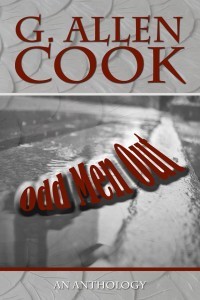
April 2, 2017
Anthology Submissions
This anthology is open to everyone. Selected authors will receive $10, a free paperback of the anthology, and any and all codes for purchasing copies at cost.
Along with a paperback edition there will be a Kindle eBook.
Send submissions--or any questions--to treblewriter@outlook.com
All other guidelines can be found at the above website. We're a little over halfway through our submissions period (4/3/2017). Thanks for considering us!
-- G. Allen
BANJAXED Books
December 22, 2016
Submissions for a New Anthology
I’ve contributed to a couple of anthologies over the past year, and it’s always fun coming up with stories that fit a set theme. Some of them were horror–one was comedy. I said it was fun, but there’s also a certain challenge vying for a coveted spot in any given collection of stories.
Mulling my goals for 2017 I decided to put out an anthology of my own–one dealing with my favorite literary theme: post-apocalypse. I don’t know why I get off on that genre, but give me “Swan Song,” by McCammon, “Canticle for Leibowitz,” by Miller, or the best of the lot, “The Stand,” by King, and I’m a happy camper. I suppose there’s a certain glee in imagining a world without reality TV, insane gas prices, and mortgages. All very pleasant…unless the apocalypse comes about by nuclear war or warring aliens.
So: Chaos of Hard Clay, an anthology of post-apocalyptic short stories. For those who wish to know more before they submit, go to Submissions on the homepage of this website. Writers have plenty of time to come up with something, as stories aren’t due till July 31. It would be swell to have twenty or so tales to include in this publication, so get thee to it!
The anthology will be put out by our publishing house, BANJAXED BOOKS, and the more contributing writers publicize the collection, the better sales will be. Large sales mean another anthology. We are a cottage industry–my wife, Kathy, serves as editor, and I serve as executive editor and publisher. My own books and collections do well, so–with a little help from selected writers–Chaos of Hard Clay should be a hot property.
So get to writing, and when the submission period rolls around, send us your best work. If time permits I’ll give feedback on those stories not selected, and, if needed, I may ask authors to amend aspects of their stories (only to make them better).
Good luck, and let’s see some original stories come out of this project. I cannot wait to read your work.
G.
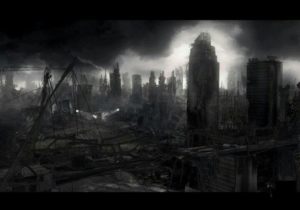
November 26, 2016
Making Plans For 2017
I hope everyone who celebrates it had a good Thanksgiving. This is the second round of holidays since my father died, and it remains somewhat painful. Still, I’m trying to move on, and my son and wife make it a bit easier.
I’ve decided to spend all of December plotting out what I’m going to write–and when–in 2017. I prefer having a plan over just winging it, and I’m ready to make the move into longer works…something that will require a stricter working schedule.
I also plan to write another musical, which is work of a much longer, more in-depth nature. It’s looking like I’ll have to split my days; mornings for dramatic work, afternoons for prose.
For now, I’m concentrating on my short story collections, especially “Christmas Eves.” If you have not downloaded this particular book to your Kindle, do yourself a favor and get it now! It is comprised of three tales, all told in a different genre:
“The Pariah Prophet”–Dark Fantasy
“She May Be Called a Sovereign Lady”–Science Fiction
“Twinkles”–Whimsy/Humor
Just the thing for this time of year!
I plan to use this blog more in the coming years, as it’s a fantastic way to communicate with readers. Blogging once a week would be optimal, but we’ll see how it goes. It sometimes feels as if my brain is a whirlpool, and once its drained…well, there’s nothing left to contribute until it fills up again. But I’d love to hear from readers, so feel free to message me. And don’t forget to find me on Facebook and Twitter! My tags are at the top of the page.
I wish you all peace and happiness. May the world’s problems be few in this time of goodwill.
Till next time!
G.
September 22, 2016
Robbed of Sleep Volume 5, Royalties, and Fall
I’ve been publishing my fiction for over a year now, and I’m one of the lucky few who receives a royalty check every month. It’s not an enormous sum of money, but it keeps the family is gas and toothpaste.
Earlier today, I checked my payments records and discovered I had another check coming my way. Giddily clicking the link to see how much I’d be getting, I couldn’t help but laugh when I saw $2.80 in the total box.
It’s the gift that keeps on giving.
Still, it means I’ve sold a couple of books, and I feel fortunate in that. I know folk who publish their work to a resounding silence. I can’t imagine working as hard as I do on my writing only to see it sit–unread–on an obscure Amazon page.
I do not write for money, but neither do I return the royalties when they come my way. I’m no blockhead. Why this month’s check was so low, I’m not sure, but it has spurred me to work harder at marketing my work. Sure, I typically see more than $2.80, but I would hate for that low sum to become the norm.
I suppose that’s why the going wisdom dictates that a writer not look at his payments on a daily basis. If I saw a lowball sum everyday, I’m sure the quality of my writing would take a woeful hit.
Ah, well. I’ve faith that next month’s royalties will be better.
Speaking of my work: I’m proud to announce that I’ve another story in the wonderful anthology, Robbed of Sleep: Volume 5, called Anemone. I consider this the best addition to the series, and I encourage you to purchase it soon. I’ve read it cover to cover, and the tales therein blew me away. It’s too bad some of the contributing writers aren’t making the big bucks, as they have the talent to do so. Then again, RoS might not be as magical as it is without said authors, so I’m glad to be counted among them.
Go to Blog and Buy on this website and click the link beneath the Robbed of Sleep: Volume 5 cover to relocate to the book’s Amazon page. If that’s too much work for you, click the cover itself below this post for the same service.
I’ve more projects in the pipeline, so check back often to see what’s new here. Till then, happy Fall. It won’t be long before the stifling heat and summer things are replaced by chilly evenings, pumpkins, and the crackle of leaves blowing across the sidewalks. All very nice. I’ve an anthology of personal stories of horror and strange fiction that would go well with this time of year–Odd Men Out. Find it over in the Blog and Buy section.
In the meantime, though, here’s the link to the new Robbed of Sleep. Enjoy!

